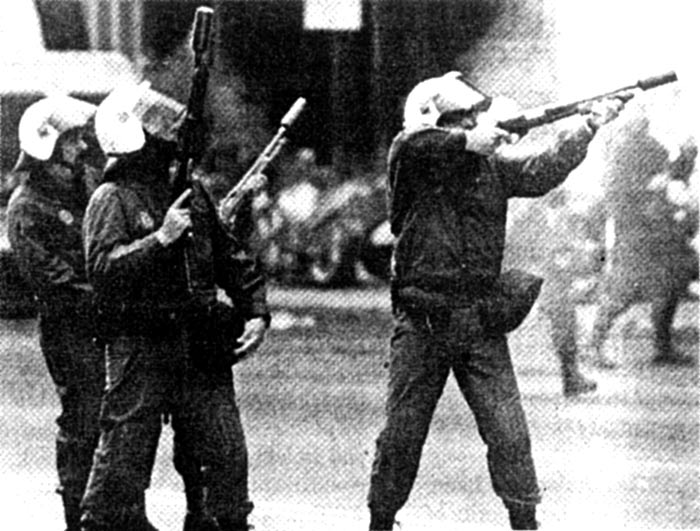
International Squatters II: Spain
The specific housing problems leading to squatting vary enormously around the world but underlying them all is the usual corruption around land and property which is found everywhere from Ankara to Zaria. This is part two of a four-part special on international squatters by Sam Beale with additional Spanish material by Emma Eastwood.
Squall 8, Autumn 1994, pp. 35-36.
The Battle for Euskal Jai
The IGA, a group campaigning for a Gaztetxe (youth-house) have squatted Euskal Jai, a massive building in the old part of Pamplona, the Basque, which had been empty for 17 years. The squatters cleaned up the building and began using it as a community/arts centre.
Since the occupation in May there have been two eviction attempts by police. Both were strongly resisted and violent clashes with police took place over two days in June when 2,000 people gathered to protest against the attempts to evict the squatters and demolish the building. A 16 year old boy lost his eye as police fired rubber bullets and tear gas into the crowds. Local residents responded with outrage and joined the campaigners in demanding police withdrawal from the area. Residents also opened their doors to people escaping police, spent an entire night banging pots and pans on their balconies to annoy the police, and dropped household objects on them when they charged protesters. One 70 year old man later received a police visit after casually dropping a pressure cooker off his balcony.
Ultimately the locals put pressure on the authorities which led to the police withdrawal. There followed a massive street party between residents, shopkeepers and squatters. Euskal Jai remains squatted and is open for gigs, workshops, exhibitions and meetings.
La Barcelona La Vaqueria
Squatting in Spain is illegal and like most other European countries is seen as a political and social statement rather than a solution to housing problems. Squatters (in Spanish ‘okupas’) tend to occupy large derelict buildings and convert them into autonomous community and cultural centres. In many cases only a few people will actually live there.
La Barcelona La Vaqueria, a rustic old building originally used as a cow shed, provides housing for about five people who organise ceramics and sculpture workshops, talks, films and benefit gigs for various movements including anti-fascism and Central American solidarity groups. All this takes place in an assortment of barns and stables in the back yard. The squatting movement in Barcelona is tightly knit, ask anybody within the community and they will all know about La Vaqueria.
Most of the squats in Madrid are concentrated in the central areas of Vallecas, Embajadores and Lavapies. La Minuesa in Ronda De Toledo had been functioning as an alternative community centre in an old printing factory for six years until it was evicted by a huge and brutal police operation in May this year. Over the years, La Minuesa had hosted many events including workshops in Martial Arts, painting, dance and languages for immigrant communities. It was also used as a meeting place for various radical collectives against racism, sexism, militarism, and forced national service. These activities, which filled a gap seen by the squatters in their community, were financed with money raised from gigs and a daily vegetarian cafe.
On the day of the eviction over 120 squatters barricaded themselves into the building and resisted police armed with rubber bullets, tear gas and metre-long wooden truncheons. Simultaneously, in the surrounding streets, over 500 people demonstrated and tried to distract the attention of the maderos (Spanish slang for the police). After two and a half hours the eviction was over resulting in 22 arrests and seven people wounded. Demonstrations of solidarity continued both in Madrid and other Spanish cities throughout the day and into the next as supporters gathered outside courthouses where those arrested were to be put on trial. National press coverage of the event was extensive and surprisingly positive.
Squatting spirits refused to be quashed by the heavy-handed police action and the struggle continues. The squatters have now gone on to occupy a number of other large buildings in the centre of Madrid with similar aims. Leaflets explaining who the squatters are, their aims and plans for the building and an invitation to the local communities to get involved and support the initiative have gone out across the neighbourhood. This not only brings support and improves relations within the community but also helps keep the local authorities off their backs.
Respect to Spanish Squatters for having managed to convey their message of self determination and improvement of the community in a grass roots stylee!
Read the other International Squatters stories
Illegal Cities
PARIS - Bank Of France Squatted
NICARAGUA - Violent Evictions In Managua
